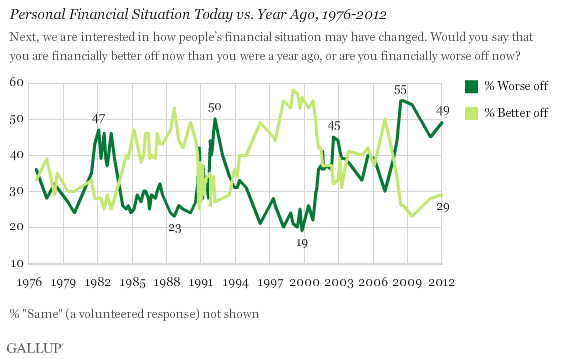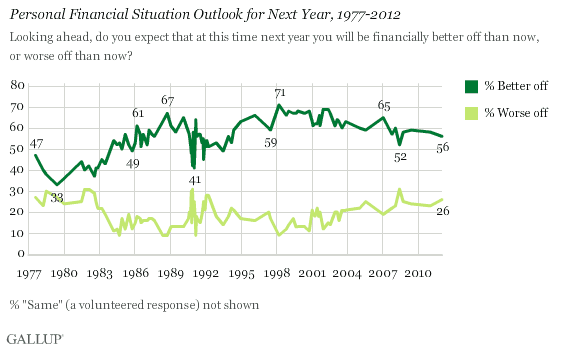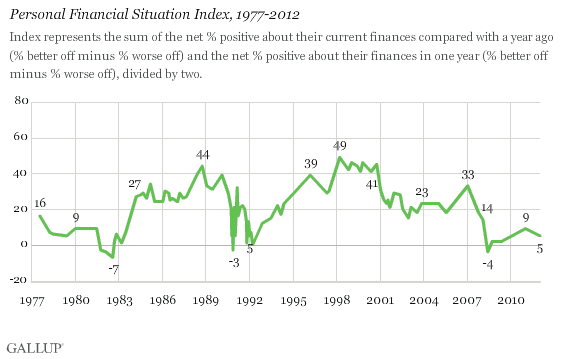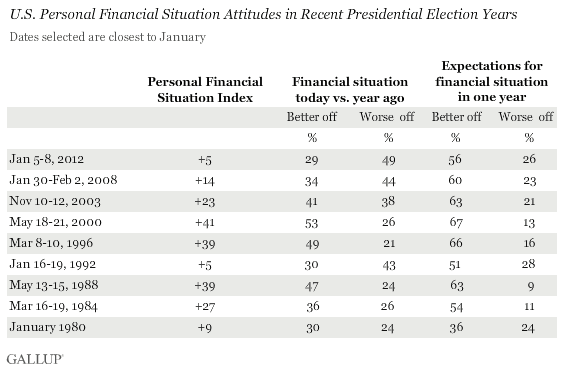PRINCETON, NJ -- Nearly half of U.S. adults, 49%, say they are worse off financially today than a year ago, while 29% say they are better off and 21% volunteer that their finances haven't changed. The percentage rating their current finances negatively compared with a year ago is down from the high of 55% recorded twice in 2008, but is still among the highest in Gallup's four decades of measuring this attitude.

The same Jan. 5-8, 2012, ���۴�ýpoll finds the majority of Americans feeling optimistic about the direction of their finances, with 56% saying they expect to be financially better off a year from now.
Gallup's trend shows that the majority of Americans have typically been optimistic about their finances on this measure. However, the 56% currently optimistic matches the average "better off" prediction for this trend since 1977, which is better than the decidedly subpar evaluation of their present finances.
A quarter of Americans, 26%, expect their finances to be worse in a year, while 14% volunteer that they will be the same.

���۴�ýsummarizes these two questions in its Personal Financial Situation Index, which averages the net positive result (percentage better off minus percentage worse off) for each question. The index has a theoretical maximum of +100 if all Americans were to say their finances are better than a year ago and expect them to be better at the same time next year. It has a theoretical minimum of -100 if all Americans were to say their finances are worse than a year ago and will be still worse in another year.
The index value for the latest results is +5, similar to the +9 recorded in January 2011 and slightly improved from the -4 in May 2008. However, it lags well behind the +20 or better scores generally seen from about 1994 through the start of 2007.

2012 Financial Mood on Par With 1992, Among Prior Election Years
It is not clear what effect, if any, perceptions of personal finances have on Americans' presidential vote preferences. However, to the extent they do influence candidate choice, a review of ���۴�ýtrends near the start of prior election years finds current attitudes most similar to the mood in 1992 and not far off from where they were in 1980 -- two election years in which an incumbent president was defeated in his bid for re-election.
Americans are a bit more negative today than they were in January 1992 about how their current finances compare with a year ago, and they are a bit more optimistic their finances will improve over the next year. However, these differences produce an identical index score of +5, the lowest of the nine presidential election years since 1980.
Among election years, early 1988, 1996, and 2000 saw Americans the most upbeat about their finances, with index scores of +39 to +41. The public's financial mood was moderately upbeat near the start of 1984 and 2004. It was somewhat less positive at the start of 1980 and 2008.

Bottom Line
The extent to which Americans are suffering financially because of the nation's protracted economic downturn is evident in the large numbers -- 49% -- saying their personal finances are worse than a year ago. With barely 3 in 10 saying their finances are better, this is among the worst evaluations Americans have given of their finances since ���۴�ýbegan measuring this in 1976. At the same time, the slight majority of Americans are optimistic about where their finances will be a year from now -- a finding that, by comparison with their ratings of current conditions, is relatively favorable.
The overall Personal Financial Situation Index resulting from these data may be worrisome for President Obama's campaign team, given that the +5 index score is close to where it was in the last two elections in which an incumbent was not re-elected, 1992 and 1980. Should the attitudes reflected in the index factor into voters' presidential preferences this fall, the Obama team may want to capitalize on Americans' tendency to believe their finances will be better in the future, in the hopes that this outweighs their anxiety about the worsening of their finances in the past year -- while the Republican candidate may want to do the opposite.
Survey Methods
Results for this ���۴�ýpoll are based on telephone interviews conducted Jan. 5-8, 2012, with a random sample of 1,011 adults, aged 18 and older, living in all 50 U.S. states and the District of Columbia.
For results based on the total sample of national adults, one can say with 95% confidence that the maximum margin of sampling error is ±4 percentage points.
Interviews are conducted with respondents on landline telephones and cellular phones, with interviews conducted in Spanish for respondents who are primarily Spanish-speaking. Each sample includes a minimum quota of 400 cell phone respondents and 600 landline respondents per 1,000 national adults, with additional minimum quotas among landline respondents by region. Landline telephone numbers are chosen at random among listed telephone numbers. Cell phone numbers are selected using random-digit-dial methods. Landline respondents are chosen at random within each household on the basis of which member had the most recent birthday.
Samples are weighted by gender, age, race, Hispanic ethnicity, education, region, adults in the household, and phone status (cell phone only/landline only/both, cell phone mostly, and having an unlisted landline number). Demographic weighting targets are based on the March 2011 Current Population Survey figures for the aged 18 and older non-institutionalized population living in U.S. telephone households. All reported margins of sampling error include the computed design effects for weighting and sample design.
In addition to sampling error, question wording and practical difficulties in conducting surveys can introduce error or bias into the findings of public opinion polls.
View methodology, full question results, and trend data.
For more details on Gallup's polling methodology, visit .
